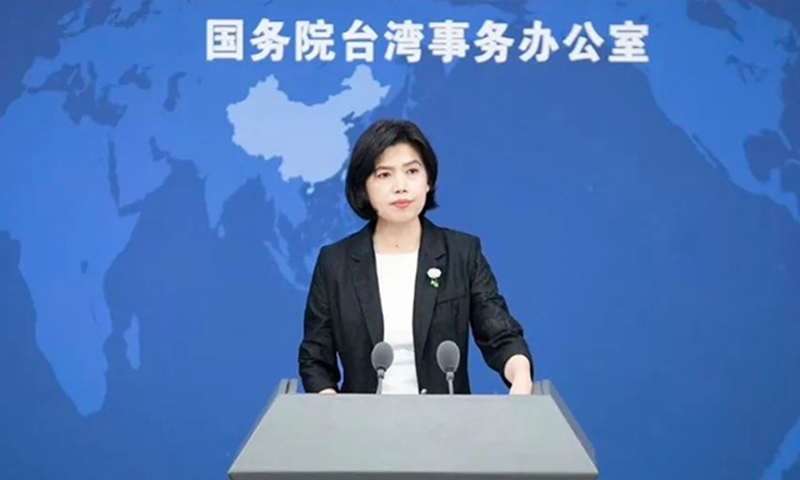
Photo: Zhu Fenglian
A Chinese mainland official on Wednesday slammed the Democratic Progressive Party (DPP) authorities in Taiwan for selling out the island's strategic industries by groveling to US tariff pressures, and vowed firm measures against the DPP's recent chip export curbs targeting mainland firms to uphold orderly cross-Straits economic and trade exchanges.
Zhu Fenglian, a spokesperson of the Taiwan Affairs Office of the State Council, made the remarks at a press briefing on Wednesday morning, when asked to comment on growing concerns among various sectors in Taiwan over the US' hefty tariffs imposed on the island.
At the briefing, a reporter noted that nearly 70 labor unions on the island formed the Taiwan Labor Action Alliance in Response to Tariff Impact, pointing out that at least 500,000 workers may be affected, but Lai Ching-te's DPP authorities have not held any talks or communications with labor groups so far, and the groups demanded to participate in tariff talks with the US, or they would take to the streets to protest.
In response, Zhu said that Taiwan's economic development is highly dependent on trade and is a beneficiary of economic globalization; any bullying behavior that disrupts the normal economic and trade order and fairness and justice will directly harm Taiwan's economic interests and people's well-being.
Facing unilateral bullying of additional tariffs and deliberate manipulation of the appreciation of the New Taiwan dollar, the DPP authorities have shown servility and submission. Instead of taking effective measures to safeguard the vital interests of Taiwan residents, they have intensified their servile flattery toward the US, betraying Taiwan's advantageous industries and groveling for favor, Zhu said.
Such a behavior of selling out Taiwan while blatantly disregarding people's livelihood and appeasing the US without any bottom line seriously undermines the interests of residents on the island, and it is entirely understandable that it has prompted dissatisfaction and protests from various sectors on the island.
In April, the US imposed 32 percent reciprocal tariffs on all imports from the Taiwan region as part of broad duties applied to all trading partners. The tariffs were later reduced to 10 percent for a 90-day period to facilitate trade negotiations, with this pause set to expire in early July, according to the Associated Press.
As an economy heavily reliant on exports, Taiwan is expected to face a significant blow if the US moves forward with steep tariffs, particularly for its vulnerable small and medium-sized enterprises, Xin Qiang, director of the Taiwan Studies Center at Fudan University, told the Global Times on Wednesday.
The DPP's persistent policy of capitulation to the US has led to a failure to safeguard Taiwan's legitimate interests, leading to the sacrifice of Taiwan's economic development and severe harm to the island's employment, core industries, and the well-being of residents, Xin noted.
Also on Wednesday, Zhu slammed the DPP authorities' recent action to place 601 entities, including Huawei, Semiconductor Manufacturing International Corp (SMIC) and other mainland chip firms, on a so-called export control list.
Zhu said that the DPP's move is intended to assist the US in suppressing mainland companies as a way to curry favor with Washington for seeking Taiwan independence through foreign support. The spokesperson vowed forceful measures to resolutely safeguard the normal order of economic and trade exchanges and cooperation, and protect the interests and well-being of compatriots on both sides of the Straits.
According to a notice issued by the DPP authorities on June 15, local companies are required to obtain licenses in advance if they intend to export to entities on the so-called control list.
Some investors on the island are concerned that the export ban could significantly affect the island's semiconductor companies. A senior industry analyst noted that over the past few years, more than 30 Taiwan firms have supplied Huawei, with transactions exceeding tens of billions of New Taiwan dollars, so the restrictions on exports to Huawei and SMIC are bound to hurt these companies, Taiwan.cn reported.
At the press briefing on Wednesday, Zhu warned the DPP authorities that technological blockades cannot stop the pace of scientific and technological innovation on the mainland, and attempts to decouple and break the supply chain will not delay the process of industrial upgrading on the mainland.
The attempt to side with the US' ill-advised attempt to contain China's tech sector is unlikely to deliver the outcome the DPP authorities hope for, Xin said, criticizing the DPP authorities' move as a short-sighted and self-defeating one, which risks eroding the foundation of peaceful cross-Straits ties and squandering vital opportunities for Taiwan's high-tech sector.






